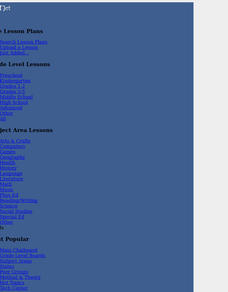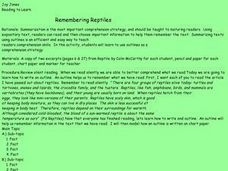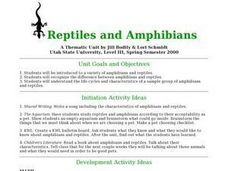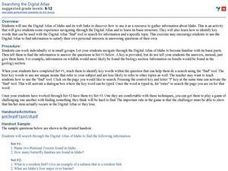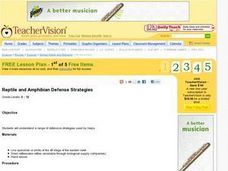Curated OER
Name Scramble
In this name scramble worksheet, students practice unscrambling the names of ten reptiles and amphibians for spelling mastery of these animals.
Curated OER
Oddball Out: Amphibians
In this problem solving worksheet, pupils analyze a row of pictures of various amphibians to determine which creature is different from the others pictured.
Curated OER
Types of Animals
Learning about animals, and their classifications, is a regular part of the elementary-school curriculum. Using this presentation, learners can review information relating to animal classification, and test their knowledge. This would be...
Larson Lab
Animal Classification
How are animals classified? Scholars explore animal classification by observing non-living and living specimens. They learn how to organize animals into vertebrates and invertebrates and identify the five vertebrate groups: mammals,...
Curated OER
Scales, Scutes, and Skins
Young scholars identify the various adaptations of reptiles and amphibians. After distinguishing between reptiles and amphibians, students discuss the ways in which their adaptations aid in their survival. They participate in a hands on...
Curated OER
Lori Schmidt's Lovely Lesson
Students color code a world map by region to show the different amphibians and reptiles that live there. They discuss the Nile Crocodile, Snapping Turtle, Komodo Dragon, Indian Python, and Lacertidae. When completed, they create a key...
Curated OER
Scales, Scutes, and Skins
Students identify the various adaptations of reptiles and amphibians. After distinguishing between reptiles and amphibians, students discuss the ways in which their adaptations aid in their survival. They participate in a hands on...
Curated OER
Verterbrate Classification
Students are introduced to the broad categories of vertebrates including fish, amphibians, reptiles, birds and mammals. They identify the characteristics of each group and then view slideshows and video of example species.
Curated OER
Animal Classification
Second graders identify characteristics of and group animals by the five categories of vertebrates.
Curated OER
Animals
Students become familiar with the need for categorizing scientific information, in this case, animals. They categorize the 5 groups of animals in a collage and answer questions about each.
Curated OER
Remembering Reptiles
Students will learn to use outlines as a comprehension strategy. Summarization is the most important comprehension strategy, and should be taught to maturing readers. During this instructional activity learners use the story of a reptile...
Curated OER
Who Am I? Reptiles and Amphibians
In this science worksheet, students examine 16 detailed pictures of reptiles and amphibians. Students identify each animal. Answers are given upside down at the bottom of the page.
Curated OER
The Anaconda
Young scholars examine basic facts about the anaconda. They discuss the length of an anaconda, estimate the length of 33 feet, compare their estimate to the actual length, and decorate the paper snake with colored scales.
Curated OER
Animal Classes-Mammal Birds Fish Reptiles Amphibian
Students learn about the characteristics of each animal classification. In this animal classification lesson plan students will first learn the characteristics of each classification. Then, they will find animals from given materials...
Curated OER
Classify That!
Students get acquainted with diverse forms of life by using modern biological classification systems to group animals that are related. They explore basic scientific groupings like genus, species, mammals, fish, birds, amphibians, and...
Curated OER
Classify That!
Young scholars explore diverse forms of life by using modern biological classification systems to group animals that are related. Students then study basic scientific groupings like genus, species, mammals, fish, birds, amphibians, and...
Curated OER
Crocodile Eyes
Students investigate the eyes and eyelids of reptiles and amphibians. In this animal biology activity, students listen to a lecture on the characteristics of amphibians and reptiles and complete a crocodile eyelid activity sheet.
Curated OER
Animals Galore
A well-designed lesson which covers the characteristics of the animals found in the six animal groups is here for your young biologists. In it, learners divide up into six groups; the amphibians, reptiles, mammals, birds, fish, and...
Curated OER
Searching the Digital Atlas
High schoolers become familiar with the tools of a digital atlas. They use a digital atlas of Idaho to located specified information. Students identify national forests, locate butterfly families, find examples of resident fish, and...
Curated OER
Reptile and Amphibian Defense Strategies
Students study the stages of the Eastern newt either by collecting a live specimen or from pictures. They note the colors of the eft stage before reading the "Eastern Newt Species Account" that shows the newt's life stages, migration,...
Curated OER
Name Match
In this name match worksheet, students match up fourteen various types of reptiles and amphibians to their formal names by drawing a line from one to the other.
Curated OER
Animal Categories
Pupils sort animal picture cards into classification groups such as mammals, reptiles, amphibians, insects and fish. They discuss the characteristics that each group of animals shares then arrange the pictures into a clasificatioon poster.
Curated OER
Design an Exhibit
Students play the roles of exhibit designers in a zoo as they create a new exhibit for herps--amphibians and reptiles. They consider all the needs--light, heat, etc.
Other popular searches
- Reptiles and Amphibians
- Reptiles Amphibians
- Amphibians and Reptiles K 2
- Reptiles & Amphibians
- Amphibians and Reptiles K
- Reptiles Amphibians Fish
- Compare Reptiles Amphibians
- Amphibians and Reptiles Prek
- Reptiles Amphibians Birds
- Amphibians and Reptiles Unit
- Amphibians and Reptiles Perk
- Amphibians and Reptiles 3 5



